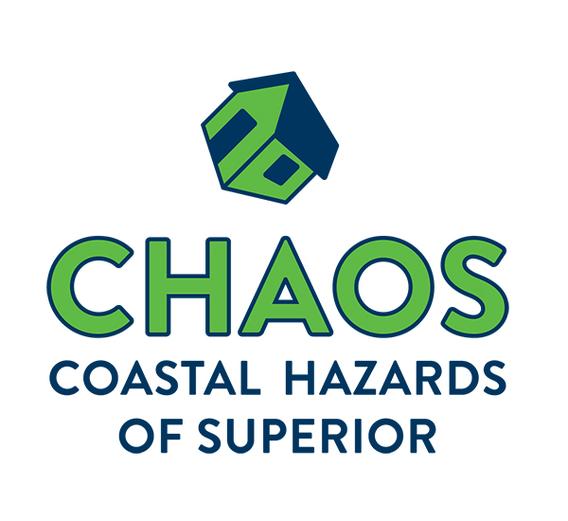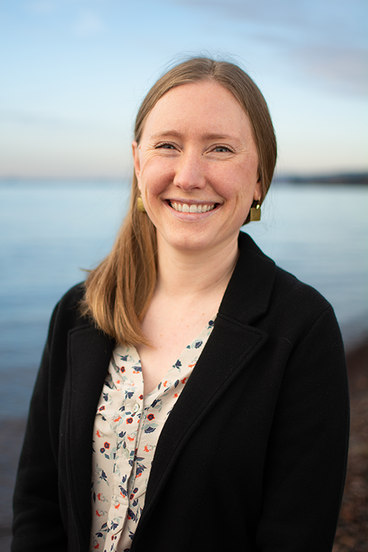
The Coastal Hazards of Superior (CHAOS) is a Community of Practice (CoP) focusing on the Minnesota and Wisconsin coasts of western Lake Superior. CHAOS is a platform for engaging local community leaders, managers, researchers, and communicators with a shared concern about coastal hazards and their impacts.
- CHAOS began in March 2020
- CHAOS CoP overview.
- CHAOS newsletters, resources and meeting materials.
- CHAOS presentation recordings.
+
What is a Community of Practice (CoP)?
A Community of Practice (CoP) is a group of people who share a concern or a passion for something they do, and learn how to do it better as they interact regularly. This definition reflects the fundamentally social nature of human learning. The CoP consists of a steering committee and community members. The Coastal HAzards of Superior (CHAOS) Community of Practice steering committee helps coordinate meetings, events, and communications; while members join to benefit from the community and share their knowledge. As a member of CHAOS, you will have the opportunity to connect with colleagues facing similar coastal hazard challenges and find the space and projects on which you can collaborate. Through CHAOS, we’ll be able to pool our knowledge and resources, accomplishing more together than we can apart.
+
Project description
The Coastal HAzards of Superior (CHAOS) is a Community of Practice (CoP) focusing on the Minnesota and Wisconsin coasts of western Lake Superior. CHAOS is a platform for engaging local community leaders, managers, researchers, and communicators with a shared concern about coastal hazards and their impacts.
What will CHAOS do? CHAOS aims to help build strong collaborations between those impacted by coastal hazards and those with resources to study, address, or mitigate impacts. Through events and communications, CHAOS will keep the community informed and facilitate regular updates on efforts to protect the coasts of western Lake Superior. Members will have an opportunity to participate in projects that will provide resources and tools to local communities, decision-makers, and private citizens to make our coastal areas more resilient.
+
Why Minnesota Sea Grant?
Why focus on coastal hazards? Coastal hazards are a pressing issue for most communities on western Lake Superior. Recent coastal storms, flooding, and shoreline erosion have placed enormous strain on local communities, while new projects to address these concerns work in isolation. The Coastal HAzards of Superior (CHAOS) Community of Practice (CoP) bring together agencies, departments, and organizations working on research, management, and outreach projects related to coastal hazards. The CHAOS CoP supports Sea Grant's mission to enhance the practical use and conservation of coastal, marine and Great Lakes resources in order to create a sustainable economy and environment.
+
What have we done lately?
- October 2024. New publication about CHAOS. Salus, Lydia & Brown, Sarah & Bechle, Adam. (2024). Addressing Great Lakes coastal hazards through regional communities of practice. Journal of Great Lakes Research. 102439. 10.1016/j.jglr.2024.102439.
- The Coastal Hazards of Superior Community of Practice steering committee continues to meet monthly to plan for the future of the group, including the launch of a potential virtual winter member meeting.
- September 2024: CHAOS hosted a fall field trip, "Red Cliff Environmental Insights: A Tour of Projects and Practices."
- July 2024: CHAOS distributed periodic newsletters to members.
- February 2024: CHAOS distributed periodic newsletters to members.
+
Participants & audience
Membership in the Coastal HAzards of Superior (CHAOS) Community of Practice (CoP) is free and open to all. The CoP strives to have representation from across the region, across disciplines, and all levels of government. All members should participate with a desire to learn about and share efforts to study, address, or prevent coastal hazards and their impacts throughout the Great Lakes region.
Why join? Members have access to a larger network of individuals working on coastal hazard issues, receive newsletters and learn firsthand about meetings, events, trainings, and funding opportunities. Participation gives members a chance to voice their needs, share resources, and engage with all of the federal, state, and local agencies and organizations dealing with coastal hazards.
How to join: Send an email indicating your interest to any one of the CHAOS steering committee members listed below:
- Adam Bechle, coastal engineering outreach specialist, Wisconsin Sea Grant
- Natalie Chin, climate and tourism outreach specialist, Wisconsin Sea Grant
- Karina Heim, coastal training program coordinator, Lake Superior National Estuarine Research Reserve
- Amber Westerbur, program manager, Minnesota Department of Natural Resources, Lake Superior Coastal Program
- Clinton Little, coastal program specialist, Minnesota Department of Natural Resources, Lake Superior Coastal Program
- Todd Breiby, program coordinator, Wisconsin Coastal Management Program
- Lydia Salus, program coordinator - project of special merit, Wisconsin Coastal Management Program
- Kathleen Angel, federal consistency and coastal hazards coordinator, Wisconsin Coastal Management Program
- Madison Rodman, resilience extension educator, Minnesota Sea Grant
Questions? Contact any one of the CHAOS steering committee members listed above.
+
Funding
Support for the Coastal HAzards of Superior (CHAOS) Community of Practice (CoP) comes from the steering committee:
+
Project history
2023
- October 2023: CHAOS distributed periodic newsletters to members.
- October 2023: CHAOS hosted the I Spy Erosion: Demonstrating a Tool to Document Visual Indicators of Coastal Erosion field trip to Schafer Beach in Superior Wisconsin. At this field trip attendees connected with coastal professionals throughout the CHAOS network and learned site assessment tools and techniques. Handouts from the field trip are available.
- September 2023: Wisconsin Sea Grant Coastal Engineering Outreach Specialist Adam Bechle and Minnesota Sea Grant Resilience Extension Educator Madison Rodman presented on Great Lakes Coastal Hazard Networks at the 2023 Great Lakes Sea Grant Network Meeting in Evanston, Illinois.
- August 2023: A case study on the importance of regional collaboration for coastal resilience with the Collaborative Action for Lake Michigan (CALM) and CHAOS was featured in the August East River Collaborative Newsletter.
- July 2023: The Coastal Hazards of Superior Community of Practice steering committee continues to meet monthly to plan for the future of the group.
- June 2023: The Coastal Hazards of Superior (CHAOS) Community of Practice distributed an early summer 2023 CHAOS newsletter reaching over 200 leaders, managers, researchers, and community members interested in coastal hazards and their impacts to the Minnesota and Wisconsin coasts of western Lake Superior.
- Spring 2023: Following the success of the Coastal HAzards of Superior (CHAOS) Community of Practice 2022 field trips, the CHAOS steering committee has begun planning for a potential summer 2023 field trip to explore coastal hazards in the western Lake Superior region.
- January 2023: The Coastal HAzards of Superior (CHAOS) Community of Practice began a transition in leadership for this network. CHAOS is now coordinated by the CHAOS Steering Committee.
2022
- In 2022 the Coastal Hazards of Superior Community of Practice gathered together for three virtual member meetings and two in-person field trips. Community members shared and learned about Great Lakes water levels, watershed management, shoreline protection efforts, and house and structure relocation.
Program Staff
Partners
- Lake Superior National Estuarine Research Reserve, Federal Government
- Minnesota Department of Natural Resources, Lake Superior Coastal Program, State/Local Government
- National Oceanic and Atmospheric Administration, Office for Coastal Management, Federal Government
- Wisconsin Sea Grant, Sea Grant Programs
- Wisconsin Coastal Management Program, State/Local Government
